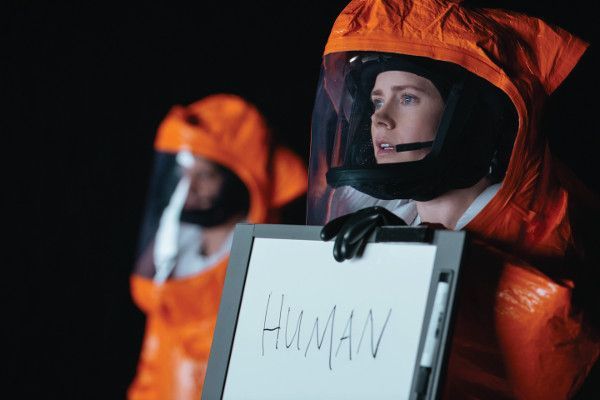Eye For Film >> Movies >> Arrival (2016) Film Review
Arrival
Reviewed by: Luke Shaw

Cinema as a medium communicates with us in a subconscious, coded way. Editing is invisible, the montage a blur that we instinctively find meaning in. When our assumptions are played on however, greatness often awaits. Denis Villeneuve is no stranger to exploring the ambiguities of the artifice of cinema, with his 2013 film Enemy representing a high point of non-literal cinema, beguiling with contradictory imagery and subjective representations of events. Arrival builds on this, but where Enemy is cynical and dark, Arrival is hopeful, warm, and breathlessly inspiring.
Alien craft suddenly appear over earth on one benign morning, but instead of attacking, they initiate a dialogue. When the US military can’t make progress, they enlist the aid of linguistic professor Louise Banks, played to worn and dogged perfection by a totally committed Amy Adams. Forest Whitaker and Jeremy Renner are wonderfully cast as General Weber and theoretical physicist Ian Donnelly, but Adams thoroughly steals the show, by strokes intimate, frustrated and courageous. Segues to her relationship with her daughter make her role a comprehensive character study rather than an arbitrary boffin versus a perplexing problem.

Like Contact before it, Arrival is a case study of the ultimate theoretical question - what would we do when faced with real, live aliens? Unlike Carl Sagan’s hard science novel, Ted Chiang's short Story Of Your Life” - masterfully adapted here by Eric Heisserer - is obsessed with linguistics over physics, and how speaking and reading a different language could change the way we perceive the entire world or our entire lives.
Despite it’s leaning towards the soft sciences, it takes an almighty leap into the sublime for its third act, artfully dovetailing its provocative ideas with a fantastic play on the assumptions of how film works and an emotional core that is as uplifting as it is devastating. Arrival is a stunning, vital film that exemplifies the greatest tenets of sci-fi as a whole. It asks us to pause and contemplate what existence might mean in a way that only sci-fi can, and it does it without sacrificing its humanity for its rigorous exploration of complex ideas.
Reviewed on: 06 Nov 2016


















